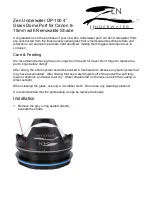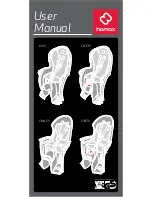
CHECKING FOR LEAKS
1 . Inflate the air spring to 30 PSI .
2 . Spray all connections and the inflation valves with a solution of 1/5 liquid dish soap
and 4/5 water . Spot leaks easily by looking for bubbles in the soapy water .
3 . After the test, deflate the springs to the minimum pressure required to restore the
system to normal ride height . Do not deflate to lower than 5 PSI .
4 . Check the air pressure again after 24 hours . A 2-4 PSI loss after initial installation is
normal . Retest for leaks if the loss is more than 5 PSI .
FIXING LEAKS
1 . If there is a problem with the swivel fitting:
a . Check the air line connection by deflating the spring and removing the line by
pulling the collar against the fitting and pulling firmly on the air line . Trim 1” off
the end of the air line . Be sure the cut is clean and square (see Fig . 13) . Reinsert
the air line into the push-to-connect fitting .
b . Check the threaded connection by tightening the swivel fitting another half turn .
If it still leaks, deflate the air spring, remove the fitting, and re-coat the threads
with thread sealant . Reinstall by hand tightening as much as possible and then
use a wrench for an additional two turns .
2 . If there is a problem with the inflation valve:
a . Check the valve core by tightening it with a valve core tool .
b . Check the air line by removing the air line from the barbed type fitting . Cut the
air line off a few inches in front of the fitting and use a pair of pliers or vice grips
to pull/twist the air line off of the fitting .
DO NOT CUT OFF THE AIR LINE COMPLETELY AS THIS WILL USUALLY NICK THE
BARB AND RENDER THE FITTING USELESS .
3 . If the preceding steps have not resolved the problem, call Air Lift customer service at
(800) 248-0892 .
Before Operating
10
MN-833
LoadLifter 5000 Ultimate
CAUTION






































